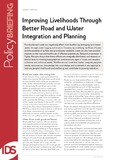Improving Livelihoods Through Better Road and Water Integration and Planning
Abstract
Poorly planned roads can negatively affect rural dwellers by damaging land-based assets, through water logging and erosion. However, by modifying the flows of water and the quantity of surface and groundwater available, roads can also have positive impacts on the lives and livelihoods of affected populations. Research undertaken in Tigray, Ethiopia shows that these effects are unequally distributed, and depend on several factors including topographical considerations, type of roads, and people’s collective and individual assets. Multifunctional roads that better integrate people’s needs, resources and knowledge into road design and construction are required to improve people’s livelihoods and wellbeing and contribute to poverty reduction.
Is part of series
IDS Policy Briefing;142Rights holder
Institute of Development StudiesCollections
- IDS Research [1671]

